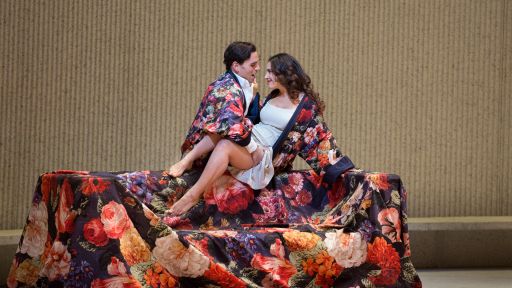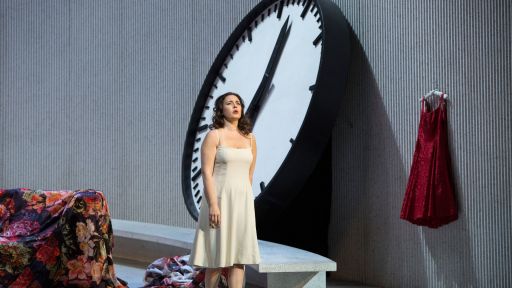Verdi’s La Traviata with the Acclaimed Sonya Yoncheva Comes to
Great Performances at the Met Friday, August 25 at 9 p.m. on PBS
Sonya Yoncheva reprises her widely praised interpretation of the heroine Violetta Valéry in Verdi’s La Traviata, on Great Performances at the Met Friday, August 25 at 9 p.m. on PBS (check local listings). Michael Fabiano is her lover, Alfredo. Thomas Hampson, in one of his most acclaimed Met roles, returns as Alfredo’s protective father, Giorgio Germont. San Francisco Opera Music Director Nicola Luisotti conducts.
La Traviata premiered at Venice’s Teatro la Fenice in 1853, and survived a notoriously unsuccessful opening night to become one of the best-loved operas in the repertoire. Following the larger-scale dramas of Rigoletto and Il Trovatore, its intimate scope and subject matter inspired the composer to create some of his most profound and heartfelt music. The title role of the “fallen woman” has captured the imaginations of audiences and performers alike with its inexhaustible vocal and dramatic possibilities—and challenges. Violetta is considered a pinnacle of the soprano repertoire.
In a remarkable career spanning six decades in the theater, Giuseppe Verdi (1813–1901) composed 28 operas, at least half of which are at the core of today’s repertoire. Francesco Maria Piave (1810–1876) was Verdi’s librettist during his productive middle period, who also worked with him on Ernani, Macbeth, Rigoletto, and La Forza del Destino, among others. Alexandre Dumas fils (1824–1895) was the son of the author of The Three Musketeers. The play La Dame aux Camélias is based on his own novel of the same name.
With La Traviata, Verdi and Piave fashioned an opera from a play set in contemporary times—an exception in the composer’s long career. Dumas’s La Dame aux Camélias was a meditation on the author’s youthful affair with the celebrated prostitute Marie Duplessis, known as a sophisticated and well-read woman whose charms and tact far surpassed her station. The play is still staged today in its original form and exists in several film incarnations, most notably Greta Garbo’s Camille (1936).
After the opening night performance, The New York Times observed that “A soprano grows into her stardom… It was a revelation to hear Ms. Yoncheva’s voice… She sounded wonderful throughout… Her voice was suffused with warmth.” The Huffington Post proclaimed, “Traviata shines anew at the Met with Yoncheva and Fabiano… A memorable operatic outing.” Mezzo soprano Isabel Leonard hosts the broadcast.
Production: Willy Decker. Set & Costume Designer: Wolfgang Gussmann. Lighting Designer: Hans Toelstede. Choreographer: Athol Farmer.
La Traviata was originally seen live in movie theaters on March 11 as part of the groundbreaking The Met: Live in HD series, which transmits live performances to more than 2,000 movie theaters and performing arts centers in over 70 countries around the world. The Live in HD series has reached a record-breaking 22 million viewers since its inception in 2006.
Great Performances at the Met is a presentation of THIRTEEN Productions LLC for WNET, one of America’s most prolific and respected public media providers.
Corporate support for Great Performances at the Met is provided by Toll Brothers, America’s luxury home builder®. Major funding for the Met Opera presentation is provided by the National Endowment for the Arts. This Great Performances presentation is funded by the Irene Diamond Fund, the Anna-Maria and Stephen Kellen Arts Fund, The Philip and Janice Levin Foundation, The Agnes Varis Trust, The Joseph and Robert Cornell Memorial Foundation, Ellen and James S. Marcus and public television viewers.
For the Met, Matthew Diamond directs the telecast. David Frost is Music Producer. Mia Bongiovanni and Elena Park are Supervising Producers, and Louisa Briccetti and Victoria Warivonchik are Producers. Peter Gelb is Executive Producer. For Great Performances, Bill O’Donnell is Series Producer; David Horn is Executive Producer.
About WNET


